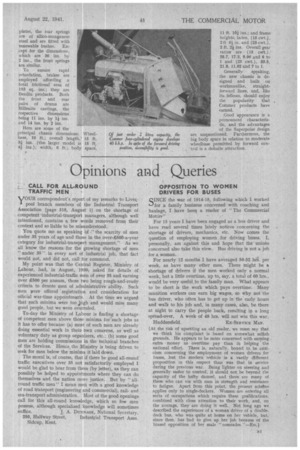Opinions and Queries
Page 27

If you've noticed an error in this article please click here to report it so we can fix it.
CALL FOR ALL-ROUND TRAFFIC MEN
VOUR correspondent's report of my 'remarks to Liver,I pool branch members of the Industrial Transport Association (page 518, August 1) on the shortage of competent industrial-transport managers, although well intentioned, contains a few words removed from their context and so liable to be misunderstood.
You quote me as speaking 'of ." the scarcity of men under 35 years of age -and those in the over-2500-a-year category for industrial-transport management." As we all know the reasons for the growing shortage of men " under 35 " in every sort of industrial job, that fact would not, and did not, call for comment.
My point was that the Central Register, Ministry of Labour, had, in August, 1939, asked for details of experienced industrial-traffic men of over 35 and earning over £500 per annum, those two being rough-and-ready criteria to denote men of administrative ability. Such men were offered .r.egistration and consideration for official war-time appointmunts. At the time we argued that such minima were too iigh and would miss many good people, but we were overruled.
To-day the Ministry of Labour is finding a shortage of competent men above those minima for such jobs as it has to offer because (a) most of such men are already doing essential work in theirOwn concerns, as well as voluntary duty as group organizers, etc.; (b) some good men are holding commissions in the technical branches of the Services. Hence the Ministry is being driven to seek for men below the minima it laid down.
The moral is, of course, that if there be good all-round traffic executives over 35 not satisfactorily employed I would be glad to hear from them (by letter), as they can possibly be helped to appointments where they can do themselves -and the nation more justice. But by " allround traffic men" I mean men with a good knowledge of road transport (engineering and commercial), railand sea-transport administration. Most of the good openings call for this all-round knowledge, which so few men possess, although specialized knowledge will sometimes
suffice. j. A. DUNNAGE, National Secretary, 250, Hallway Street, Industrial Transport Assn.
Sidcup, Kent. OPPOSITION TO WOMEN DRIVERS FOR BUSES
SINCE the war of 1914-18, following which I worked for a family business concerned with coaching and haulage, I have been a reader of "The Commercial Motor," For 15 years I have been engaged as a bus driver and have read several times lately notices concerning the shortage Of drivers, mechanics, etc. Now comes the question of employing women for driving buses. I, personally, am against this and hope that the' unions concerned also take this view. Bus driving is not a job for a woman.
For nearly 12 months I have averaged 50-52 hrs. per week, as have many other men. There might be a shortage of drivers if the men worked only a normal week, but a little overtime, up to, say; a total of 60 hrs., would be very useful,to the family man. What appears to be short is the work which pays overtime. Many munition workers can earn big wages, so Why not the bus driver, who often has to get up in the early hours and walk to his job and, in many cases, also, be there at night to carry the people back, resulting in a long spread-over, A week of 48 hrs. will not win this war.
Huddersfield. Ex-SERVICE MAN.
[At the risk of upsetting an old reader, we must say that we think his complaint is based on somewhat selfish grounds. He appears to be more concerned with earning extra • money as overtime pay than in helping' the national effort. There is, naturally, bound to be criticism concerning the employment of women drivers for buses, but the modern 1vehicle is a vastly afferent proposition in this respect than was that in service during the previous war. Being lighter on steering and generally easier to control, it should not be beyond the capacity of the hefty damsel, and there are many of these who can vie with men in strength and resistance to fatigue. Apart from this point, the present schelne applies only to single-deckers. Women are entering all sorts of occupations which require these qualifications, combined with close attention to their work, and, on the average, they are doing it well. Not long ago we described the experiences of a woman driver of a doubledeck bus, who was quite at home on her vehicle, but, since then, has had to give up her job because of the biased opposition of her male " comrades."—En.]




























































